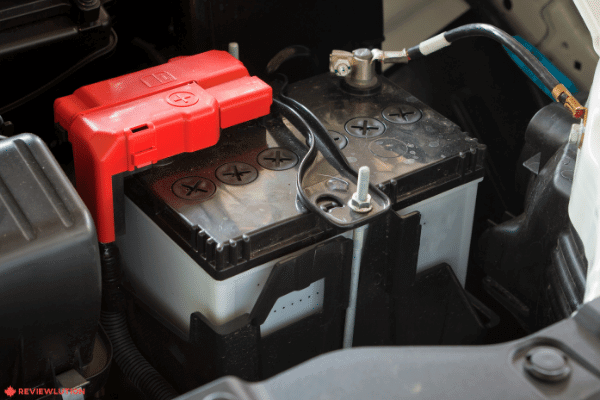How Much Is a Car Battery in Canada?
Canada’s climate extremes – especially the cold weather – take a serious toll on your car’s battery.
This is why the CAA recommends checking your battery’s health ahead of the winter season.
If the time has come to change the battery on your car, you’re probably wondering “how much is a car battery?”
Let’s find out.
How Much Does a Car Battery Cost?
A car battery can cost you anywhere between $100 and $300 on the low end, depending on the size, quality, and power.
For example, the average car battery price for acid-lead batteries is around $100.
Absorbent glass mat (AGM) batteries, which have become the new norm because they offer much more power, can cost up to $300 and more, especially if it ranks as high-end.
We looked into car battery prices of the most popular batteries on the market, starting from low-end to high-end batteries.
Here’s what we’ve found.
| Low-end battery | |
| Brand and battery type | Price |
| ACDelco ACDB24R AGM Group 51 | $170 |
| Optima Red Top SLI AGM | $200 |
| Interstate 12V 35AH AGM Deep Cycle | $230 |
| Medium-end battery | |
| Brand and battery type | Price |
| Deka Intimidator 9AGM40 AGM | $250 |
| XS Power D3400 XS Series 12V 3,300 AMP AGM | $320 |
| Kinetik 12V 3800W High-Current AGM | $490 |
| High-end battery | |
| Brand and battery type | Price |
| Weize LIFEPO4 12V 100AH Deep Cycle
7,000+ cycle |
$600 |
| FXnn LIFEPO4 12V 40AH | $970 |
| Ampere Time 24V LIFEPO4 Deep Cycle, 4,000+ cycle | $1,400 |
Need a loan to buy your dream car? Here’s where you can find the best car loans in Canada.
What Affects the Price of a Car Battery?
The cost of car batteries is affected by a variety of factors, including performance, size, type of technology, and even warranty.
Let’s take a closer look at each of these factors, break down the different battery types, and how they affect the average car battery price.
Size
Batteries are categorized into different size groups to accommodate different types of vehicles and their engines.
If you have a heavy-duty vehicle that requires a more powerful battery, you can expect to pay more for it than for a regular car battery.
Larger batteries can deliver more power because they have more acid and larger plates, which adds to the overall car battery cost.
Technology
Car batteries can use different technology to give your vehicle the power it needs. This is, arguably, the most important factor that affects the price.
How much you’re willing to pay will determine the quality of the battery you get and its longevity. High-end technology batteries are pricey, but will also last you much longer than standard batteries and boost your car’s performance.
Here are the types of batteries you’ll find on the market:
Lead-acid
Lead-acid batteries were the golden standard in the past.
Also known as wet-cell batteries, lead-acid batteries have plates flooded in acid which produces charge that helps start and run the car’s engine.
Although they are not exactly the latest technology in the automotive world, they have evolved considerably in the past several years. For example, back in the day, drivers had to constantly check the battery’s fluid level, which is no longer the case because now they have sealed plates.
The average cost for a lead-acid car battery is around $100. It’s cheaper than other types of batteries, but their lifespan is also shorter. You’ll be paying less but you’ll have to replace it sooner, rather than later.
But if you’re on a tight budget, a lead-acid battery is an excellent option.
Absorbent glass mat (AGM)
AGM batteries are essentially an advanced version of lead-acid batteries.
Just like lead-acid batteries, the lead plates of the AGM battery produce power from the chemical reaction between the plates and the acid.
The difference is that AGM batteries use an absorbent glass material that traps the acid and prevents it from leaking. This eliminates the need for sealed plates or anything of similar nature because these batteries are entirely spill-proof.
What’s more, AGM batteries generate more power due to their mechanism which allows better contact with the lead plates. They also work better in extreme weather conditions and are more resistant to high vibrations.
AGM batteries are more expensive than lead-acid batteries, but they generally work out cheaper in the long run.
Gel
Gel batteries work similarly to lead-acid and AGM batteries. However, instead of acid, they use a thick gel which ensures stronger contact between the lead plates and the acid.
Since they use gel-like acid, they’re 100% spill-proof like AGM batteries and can easily maintain acid levels.
Given that they get all the perks of lead-acid and AGM batteries and none of the cons, they’re pricier than their competitors. They typically cost between $300-350 each.
Lithium-ion
Lithium-ion batteries, also known as LIFEPO4 (Lithium Ion Phosphate), are a crucial piece of high-performance vehicles because they generate greater power than standard batteries.
These are high-quality batteries that offer unmatched reliability and performance, which is why they power most electronic devices like smartphones and laptops and can be found in many electrical vehicles such as Tesla X and S models.
Lithium-ion batteries come with longer warranties and are more resistant to cold temperatures – which is why they can cost up to $1,000.
Performance in Cold Weather
Cold weather performance and durability is one of the most significant factors that determine a new car battery price, especially given that winters in Canada can be extreme.
A battery’s performance in cold weather is also known as cold-cranking amperage. The higher the cold-cranking amperage, the better resistance in cold weather.
Car batteries are rated at two different cranking amps:
- Regular cranking amps batteries or Cranking Amps (CA) at 32F.
- Cold Cranking Amps (CCA) at 0 F.
If you live in an area where the winters are relatively harsh, you’ll need CCA batteries designed to perform at 0 F below – which cost more than those that rank differently.
Warranty
When shopping for a car battery, it’s important to consider the warranty that comes with it. A longer warranty means a more expensive battery, which, in most cases, is worth it.
Paying a bit more for a warranty that lasts longer pays off more in the long run because you can replace the battery for free if it stops working.
Conclusion
Hopefully, our article gave you an idea of where to begin when looking to replace your old car battery. Considering all the factors that affect the car battery replacement cost and the battery performance, choose wisely, because having the right car battery can make a huge difference.
FAQ
The average cost for a car battery is $100-$250. Gel and lithium-ion batteries are typically more expensive and can cost up to $1,000.
A car battery replacement can cost $25 for a simple installation at an auto shop or $100 or more for a more complex installation.












